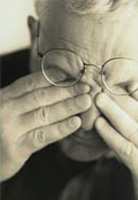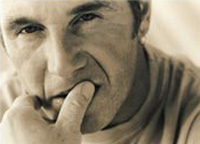Many peoples first experience with cancer begins quite simply with the discovery of a symptom or sign known to be a possible cancer indicator. A lump, a sore that has changed in appearance or hasn’t healed properly, any persistent severe pain, the presence of unexplained blood, a sore throat or cough that persists -these are several of the most common signs. From this moment, the uncertainty of cancer begins. Could this symptom mean cancer, or can I assume it’s nothing?

This moment, before the doctor has even been called or a single test has been done, often transforms a person’s life from one of general well being and confidence, to one of enormous anxiety and uncertainty about the future. This pervasive sense of uncertainty probably characterizes the journey with cancer more than anything else. It often lessens when things are going well, but it is a feeling that never completely goes away. This seems to be what people mean when they say, “The diagnosis completely changed my life.” That wonderful sense of certainty and expectation of continued life and health, a kind of denial that the bubble can ever burst, which we all start out with, is destroyed forever. Learning to live with uncertainty becomes the bottom line in dealing with cancer.
Many people who notice a “suspicious” symptom have encountered cancer before through the illness of a loved one, such as a parent or grandparent. If a symptom suggests that you might have the same type of cancer as your loved one had, you may become terrified. Fear that you might go through the same vividly recalled cancer experience as someone close to you did, can be overwhelming. In such cases, a person may be too frightened to go to a doctor. A sense of hopelessness (if it’s cancer, nothing can be done) or a feeling of panic can paralyze your ability to act. This can be the case for some who have seen family or friends with cancer. They can fear it so much, that they delay being treated, sometimes for something that isn’t even cancer.
Others have not had such personal experiences, but have seen cancer statistics in the media and are extremely afraid of “learning the worst.” They delay going to the doctor, even though most warning signs turn out to not be cancer. These feelings of fear, leading to the ostrich syndrome, wanting to put your head in the sand and thinking that the problem will just go away, can be both dangerous and foolhardy if the problem turns out to be cancer. As most people now know, a cancer diagnosed in the early stages is usually curable. So it is far better to overcome the fear or denial and see a doctor. The relief that follows finding out that it was nothing important allows life to get back to normal, and the fears can be laid to rest. If the problem does turn out to be cancer, you will get a head start on the treatment and improve your chances of cure.
If you are putting off checking out a suspicious symptom because of anxiety, it best to call your physician rather than letting your anxious feelings keep you from going through appropriate tests. Also, let your doctor know that you’re having a lot of anxiety about what is happening, and that you may need help to control the fears, especially if difficult tests like scans or sonograms, are ordered. If you have been troubled with anxiety in the past, or if you have feared cancer, it may be wise to ask your doctor for a referral to a mental health professional to help you get through the tests and procedures. The same advice holds for friends or loved ones who have these problems; you can play a pivotal role in ensuring they get help.
Before you go to the doctor, you may wish to make some notes to take with you so that you can give an accurate account of your symptom. You may also wish to have a family member or close friend accompany you, since it is sometimes hard to remember things when you feel nervous. Also, it is important to have family involved in the decision making process, and this way they will have all the information to do so.

Once you have seen the doctor and had an examination, and the tests have been ordered such as biopsy or scans, your thoughts may alternate between “It’s probably nothing” and “I know it’s the worst.” Feelings of optimism and despair change from hour to hour. This is part of the response to the possibility of hearing bad news: anticipating what you may feel should it be cancer. For most people this is one of the most difficult times for them-waiting to hear the news.
Most tests today, including bone scans and sonograms, are generally performed on an outpatient basis rather than in the hospital, so it is good to take someone along to help you get home. You may not feel up to par if you’re drowsy from medication that was given with the procedure.
The diagnostic tests themselves may be difficult to tolerate if you have phobias-intense and overwhelming fears-of doctors, hospitals, needles, seeing blood, or claustrophobia during an MRI. If you have high anxiety or strong fears about any of the diagnostic procedures, your doctor may prescribe an anti-anxiety drug to help you through the process. It is important that you discuss your emotional state with him as well as your physical situation.
If you have had fears of being confined in a small space (claustrophobia), you may find magnetic resonance imaging (MRI) to be frightening. This scan requires being placed in a small cylinder surrounded by a large, noisy machine. About 20 percent of people find it hard to tolerate, and about 5 percent are unable to go through with it. There are ways to make it easier today, such as listening to music or relaxation tapes or taking a medication to reduce your anxiety during the procedure. Tapes with instructions for relaxation, guided imagery, and medication can be listened to ahead of time to help you become calmer. When you have an intense fear or phobia, it may seem so overwhelming that you cannot imagine overcoming it. But your doctor or a mental health professional can help you to relieve the fear to the point that you can get the medical tests you need.
The workup is important to determine the medical situation and to help you decide on a treatment course; therefore, any fears or phobias standing in the way must be looked into. Let your doctor know that you’re frightened, that this fear has troubled you in the past; you can receive mediation to be less anxious. Later, ask for a referral to a mental health professional to treat the phobia, so that you can get through future tests more easily.
The diagnosis
Many people describe the period of waiting between hearing the diagnosis-the dreaded words “You have cancer”-and the start of their treatment as the worst time in their illness. The anxiety begins to peak when the bad news is given, but there isn’t as yet any plan in place to move ahead and fight it. It is difficult to tolerate the feeling that there are cancer cells in your body and nothing is being done to destroy them. The unspoken fear that “I might die” may seem more overwhelming when you are not yet receiving treatment.
This generalized anxiety can be compounded by worries about particular treatments. People worry about chemotherapy, for example, because they carry visions of chemotherapy as it was given twenty years ago, before drugs were available to control nausea and vomiting and other troublesome side effects.
Cornelius Ryan, famed reporter of the American forces’ invasion of Europe in World War II, kept a diary of the time surrounding his diagnosis of prostate cancer in 1970. Ryan who wrote the best-seller The Longest Day, dictated tapes that were his secret way of coping with the shock and the meaning of the diagnosis. He described in a masterly manner some of the emotions so many people feel.
The diagnosis changes everything… Now cancer will be my closest possession, going with me from the office to house to conferences and dinner parties, as I go myself. I have got to get used to having it always here. I have got to think of what influence it may assume in time, not only over me, but on my family, friends and work . . . What comes to mind immediately is how fast cancer alienates one from the usual routines and behavior . . . It is odd that apart from a slight aching of the prostate . . . there is no pain, no dramatic change caused by this malignancy except in my mind. Does this cancer really exist? Did some harassed technician mix my slides with those of some other poor bastard? I am grasping at straws. I suspect it is not uncommon in the first few hours. There is simply no way to maintain a precise progression of thoughts and actions after such an emotional shock. My mind swings from disbelief to fatalism. I am vacillating between a surging belief that all will be well and a maudlin conviction that nothing will ever be right again . . .
Just now I thought of something that is probably the closest comparison to my present predicament I have ever experienced. During World War II, I found myself caught up in a patrol in a minefield. My reaction, and I remember it so well, had two distinct plateaus: how did I get myself into this situation? And, now, let’s get out of it. Curiously, back then, I cannot remember experiencing fear. Neither do I recall any great surge of courage. I think my reaction was mechanical. There was no point in dwelling on the fact that we were in a minefield. The sole objective was to get through it safely-and somehow we did . . . Now, as in those wartime days, I don’t know what steps will bring me through this grave ordeal, but I can’t stay rooted to one spot forever . . . Without scientific knowledge to back me up, I would guess that the worst time emotionally is in the first few hours after you get the bad news.
Ryan says it all, in terms of those early responses to hearing the diagnosis. In other excerpts, he tells of his anger: “Why my body? Why now when I have so much to write?” Then he berates himself for his self-pity but retains his humor as a way of expressing the anger: “There’s a mosquito in here buzzing around the desk. If it stings me, I hope the damn thing gets cancer.”
Early in the work on this topic at Memorial Hospital, Dr. Massie and Dr. Holland tried to understand these first responses to a cancer diagnosis. People were responding in the same way that people do when faced with other kinds of catastrophic news, the death of someone close, a natural disaster such as an earthquake, or a personal catastrophic like the loss of a limb-that profoundly affect life and the future. They began to see a general pattern to hearing the bad news. There is an initial response of denial and disbelief. “This can’t be true! It’s a mistake. I’m sure the slides sent to pathology were mixed up or the doctor confused my tests with somebody else’s. It simply can’t be happening to me.” Ryan said it by suggesting that a harassed technician reversed the slides. This couldn’t be happening to me” – All this is probably the psyche’s protective device to provide a little time and space to let the information “sink in”, so that the person does not feel instantly overwhelmed.

The second stage is called the turmoil phase. The truth can’t be denied; it is cancer. You begin to confront the reality more directly. This often creates a period of restlessness; fearfulness which is hard to control; and preoccupation with the diagnosis and its implications. There is a sense of helplessness (What can I do?) and hopelessness (I can’t find a way out), alternating with a sense of vague calm (Everything will be okay). Sleep and eating may become erratic, and concentration on work routine activities becomes impossible. You may repetitively go over all the fears that the word cancer conjures up: possible death with much pain, becoming disabled, perhaps needing surgery that will drastically change your body function or appearance, becoming dependent on others, losing the sense of acceptance from your family and friends, and then the terror of final abandonment. We know that these fears are exaggerated far beyond the actual likelihood of their happening. Still, they are powerful, as described so well by Ryan in his tapes. This stage often lasts a week or two, usually ending when you begin treatment and regain a sense of hope.It is important to realize that this turmoil is a common, normal response to the threat to your life. You are not “going crazy.” It is unfortunate that important decisions about treatment must be made during this time of high distress when thinking clearly is apt to be most difficult.
Today, many people seek several opinions about what the best treatment might be, and the opinions are often different.
Jack Price felt about his melanoma treatment that “surgeons are selling surgery; radiotherapists are selling radiation treatment . . . You know, it seems like the old saying that when you have a hammer in your hand, everything you see is a nail!”
Deciding whom to trust and with whom to cast your lot depends first on the treatment making sense to you, but also on finding a doctor you feel you can trust and who seems to have your best interests at heart. Ideally, your doctor should work in a multidisciplinary hospital that has the necessary equipment and highly qualified staff to provide expert care perhaps involving several different treatment types, such as surgery and radiation. They should be capable of handling whatever complications may arise, as occasionally they do. It’s good during this tough, stressful period to take on day at a time, make one decision at a time, and keep a clear head and calm mind. Because of the difficulty in processing information when highly stressed, you may wish to have a relative or close friend help you gather information, meet your doctor, and help you weigh your options. But remember that the final decision-making is yours, it is your life and well being that is at stake.
A decision also has to be made quickly regarding whom you wish to tell about your diagnosis, both in the family and outside. For some people, maintaining the aura of health is important for the financial or psychological well being of others. They may find it difficult to make their illness public. Some of us recall the watershed events that led to drastic changes in social attitudes about cancer in the United States when Betty Ford, then the First Lady, made public her breast cancer and its treatment. Happy Rockefeller, Nelson Rockefeller’s wife, did the same. It was suddenly okay to say you have cancer and to reveal the extent of it. They both announced that they had positive nodes under the arm and would receive chemotherapy. A great deal of stigma surrounding cancer, specifically breast cancer, was lifted. Today, an honest and open approach that reveals the diagnosis leads to the best opportunity for receiving the helpful support of others, although this attitude may be modified by personal style or circumstances.
The third stage of adjustment to the diagnosis usually comes when treatment begins, with the relief that comes from doing something about it. People usually feel reassured and become more optimistic as the treatment starts and they begin to work actively to combat the cancer and to return to their normal life. This is when we see the emergence of the many different ways people handle life’s adversities. We enter into the realm of coping with disease and the broad range of coping styles developed by people on their own, honed by years of their own life experiences.
Most studies, when you sum them up, suggest that what works best is dealing head-on with the issues of illness and treatment, seeing them as problems to be solved. This mind-set encompasses people who want to do extensive research to find the right doctor and treatment, as well as those who are content to move forward without getting more opinions, wishing to get on with the treatment as soon as possible. What we know doesn’t work well, as mentioned earlier, is the ostrich syndrome: passively refusing to deal with the diagnosis realistically.
Surely, there are as many ways of coping as there are people, but the key is to be certain that the diagnosis doesn’t paralyze you into inaction and the inability to seek treatment. Finding a doctor with whom you can talk comfortably and honestly and work with as a partner, is a key to success. When you connect with such a doctor, the two of you become a team; coping becomes easier because you have someone who will face the fears with you.




